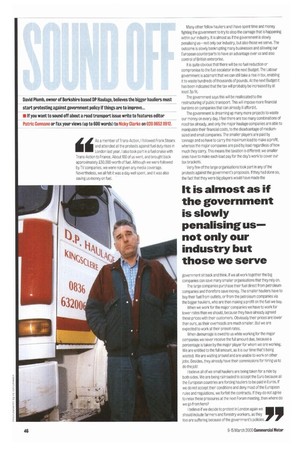dd As a member of Trans-Action, I followed Frank Stears
Page 48

If you've noticed an error in this article please click here to report it so we can fix it.
and attended all the protests against fuel duty rises in London last year. I also took part in a fuel cruise with Trans-Action to France. About 100 of us went, and brought back approximately 230,000-worth of fuel. Although we were followed by TV companies, we were not given any media coverage. Nevertheless, we all felt it was a day well spent, and it was also saving us money on fuel. Many other fellow hauliers and I have spent time and money fighting the government to try to stop the carnage that is happening within our industry. It is almost as if the government is slowly penalising us—not only our industry, but also those we serve. The outcome is slowly bankrupting many businesses and allowing our European counterparts to have an advantage over us and also control of British enterprise.
It is quite obvious that there will be no fuel reduction or compromise to the fuel escalator in the next Budget. The Labour government is adamant that we can still take a rise in tax, enabling it to waste hundreds of thousands of pounds. At the next Budget it has been indicated that the tax will probably be increased by at least 3p/lit.
The government says this will be reallocated to the restructuring of public transport. This will impose more financial burdens on companies that can already ill afford it.
The government is dreaming up many more projects to waste our money on every day. I feel there are too many combinations of road tax already, and only the major haulage companies are able to manipulate their financial costs, to the disadvantage of mediumsized and small companies. The smaller players are paid by tonnage and so have to carry the maximum load to make a profit, whereas the major companies are paid by load regardless of how much they carry. This means the taxation is different: we smaller ones have to make each load pay for the day's work to cover our tax brackets.
Very few of the large organisations took part in any of the protests against the government's proposals. if they had done so, the fact that they were big players would have made the government sit back and think. If we all work together the big companies can save many smaller organisations that they rely on.
The large companies purchase their fuel direct from petroleum companies and therefore save money. The smaller hauliers have to buy their fuel from outlets, or from the petroleum companies via the bigger hauliers, who are then making a profit on the fuel we buy.
When we work for the major companies we have to work for lower rates than we should, because they have already agreed these prices with their customers. Obviously their prices are lower than ours, as their overheads are much smaller. But we are expected to work at their preset rates.
When demurrage is owed to us while working for the major companies we never receive the full amount due, because a percentage is taken by the major player for whom we are working. We are entitled to the full amount, as it is our time that's being wasted. We are waiting around and are unable to work on other jobs. Besides, they already have their commissions for hiring us to do the job!
I believe all of we small hauliers are being taken for a ride by both sides. We are being railroaded to accept the Euro because all the European countries are forcing hauliers to be paid in Euros. If we do not accept their conditions and deny most of the European rules and regulations, we forfeit the contracts. If they do not agree to relax these pressures at the next Forum meeting, then where do we go from here?
I believe if we decide to protest in London again we should include farmers and forestry workers, as they too are suffering because of the government's policies.








































































































